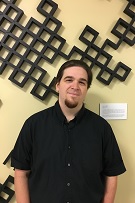New Approach to Solving Problems Earns FSU Professor Elkins Professorship
Dr. Justin Dunmyre’s passion for mathematics and education is what earned him the 2018 Wilson H. Elkins Professorship. The Learning Assistant Program (LAP), created by Dunmyre in the mathematics department, re-energized the teaching of math – and earned him a moment in the spotlight.
Created in 1978, the Wilson H. Elkins Professorship was the first endowed, university-wide professorship at the University of Maryland. It commemorates Wilson H. Elkins, the President of the University of Maryland from 1954 – 1978, whose leadership increased the size, scope, and standing of the university. Candidates must demonstrate an ability and desire to lead and inspire students beyond the classroom. The fully endowed professorship offers resources to further teachers’ professional work and research beyond the classroom.
“It was a long shot,” Dunmyre recalled when asked about the application. He applied for the professorship and heard absolutely nothing for months. Once the winners were announced in an email simply labeled as “decision,” Dunmyre noted he had to read it multiple times to make sure it was true.
“It was definitely an ego boost, it was nice to be recognized and it gives you confidence,” Dunmyre said, but “it’s a little embarrassing, I do not want the spotlight.”
In high school, Dunmyre had negative feedback from his teachers with some warning him to “not waste his parents’ money.” Dunmyre later attended Pennsylvania State University (PSU) as a dual major in computer science and mathematics. Early in his college career, Dunmyre credits a tutoring experience for provoking the interest in education. While at PSU, Dunmyre studied abroad in Tokyo and mentioned he often found he had an abundance of time on his hands, which is what led him to pursue mathematics. In Tokyo, Dunmyre began to sit down and do math, just for the sake of doing math. Following the completion of both bachelor’s degrees from PSU, Dunmyre went on to attend the University of Pittsburgh (Pitt) where he earned both his master’s and his doctorate degree. Dunmyre was part of a successful research program at Pitt, which led him to pursue mathematical neuroscience.
After completing his doctorate, Dunmyre was a visiting Assistant Professor at the University of Michigan for three years. While there, Dunmyre learned he liked research, but teaching was something he enjoyed more. Noting an “identity crisis” and a competitive job market, Dunmyre anticipated that it would be difficult to find a job in an area in which he wanted to live. That’s when the position at Frostburg State University opened up, and Dunmyre found he could focus his energy on teaching.
Dunmyre repeatedly noted that Dean Campbell does not get enough credit. It was her, he said, that pushed him to apply for the award. Dunmyre hopes this award is something that does not just highlight him, or even just the math department, but something larger than that. He believes it is critical to extend the LAP to other departments as well.
The LAP formation was something that was twofold. It began as a redesign on the college algebra program, which incorporated lab assistants to help in the classroom. Once the program folded, the lab assistants remained in the tutoring center.
Laughing, Dunmyre recalled that Dorris Santamaria-Makang, currently the university’s associate provost, was the one who wanted him to attend a workshop on learning assistants that admittedly so, he did not want to attend. It was at this workshop, hosted by the University of Colorado – Boulder at the University of Maryland, where Dunmyre decided that the LAP was something he needed. With the help of Santamaria-Makang, the LAP was launched.
Students are 55% more likely to fail a STEM class that is lecture style rather than facilitated around group work. Dunmyre noted that it is harder to do group work in a STEM class, but the “payoff is worth it.” He found that in a class with approximately 32 students, he could not spend time with groups in a functional environment. He uses both group discussions and whole class discussions to help students work through problems. This approach helps students develop skills rather than just memorize.
In her seventh semester as a learning assistant, Reagan Joy emphasized the importance of having learning assistants in the classroom by saying, “math is usually seen as a very frustrating class for students. Giving autonomy to the students and allowing them to experience math in a way that builds determination, the desire to learn from failure, and to not fear failure is what many of the classes in the math department strive for.”
Sarah Sparks also had nothing but positive things about Dunmyre, noting, “he was an incredible professor, a wonderful mentor, and now a great friend. Without him I would not have even known about the graduate program I am currently enrolled in. He exposed me to so many research opportunities and was always willing to help when I was struggling, even if it was in another math class. He has been my biggest supporter, and I owe much of my academic success to him.”
The LAP was in place for a year and was successful, allowing it to be renewed for another year, then continuing its presence in the math department to today. The learning assistants are student employees who assist in the classroom and are available in the tutoring lab Sundays through Thursdays. They are available as a resource to students that is included in their course fee to answer any questions and provide outside assistance.
Dunmyre said that the program is “transformative for students and the learning assistants.” It made his teaching better. Dunmyre emphasized the importance of the LAP for the learning assistants, as they grow tremendously in the role. Three learning assistants are now in fully funded PhD programs. Sparks, a FSU alum who was a learning assistant for 2.5 years said this of the LAP, “it gave me invaluable hands on teaching experience and led me to discover a passion that I had for it. Being a part of this program had a huge influence on my decision to attend graduate school for Mathematics Education and helped prepare me for my own teaching that I am doing now.”
Joy also mentioned, “I realized the problem-solving techniques and people skills I was learning were applicable to all aspects of my education. I am currently taking foundations of mathematics as preparation for Law School. The thinking skills that math requires extend far beyond math applications.”
With this award, Dunmyre hopes to reach out to other departments and empower them to use pedigo, the study of teaching. He wants other departments, particularly chemistry, to implement the LAP. The professorship gave Dunmyre $14,000 to use as in incentive to spread the LAP to other departments.
Joy agrees and believes that LAP would benefit other departments as she mentioned, “Learning Assistants can be helpful in classes from chemistry and physics all the way to history and philosophy. The program would allow teachers to reach more students. LAs are also seen as more approachable to many students and can help bridge the gap between students and teachers. LAs can also make observations in the classroom that professors sometimes don’t, like a student having different behavior than usual or not getting along with a classmate.”
Dunmyre plans to use the cash incentive to redesign a course in another department, which requires a lot of work. This leaves enough money to pilot the program in another department for two semesters. After this, the Dean can help work to fully fund the program and continue its existence.
“It’s an honor to be able to impact students,” Dunmyre said. “Changing their attitudes can change their lives, and education is a powerful tool to do so.”
He wants students to see that the professors do care and are trying to be the best teachers they can be. Joy believes that he achieved that goal: “I genuinely love math because of Dr. Dunmyre. I wouldn’t be the student or person I am today without him, and I am so glad that he has been a part of my life.”
He aspires for the math department to continue to have a reputation for good teaching, and he firmly believes that the LAP is one way to do so. Dunmyre hopes to share this momentum with other departments and get them on board.
“Mathematics is the most beautiful subject,” Dunmyre said with a big smile on his face. “What? No one else has a claim to make like that.”




